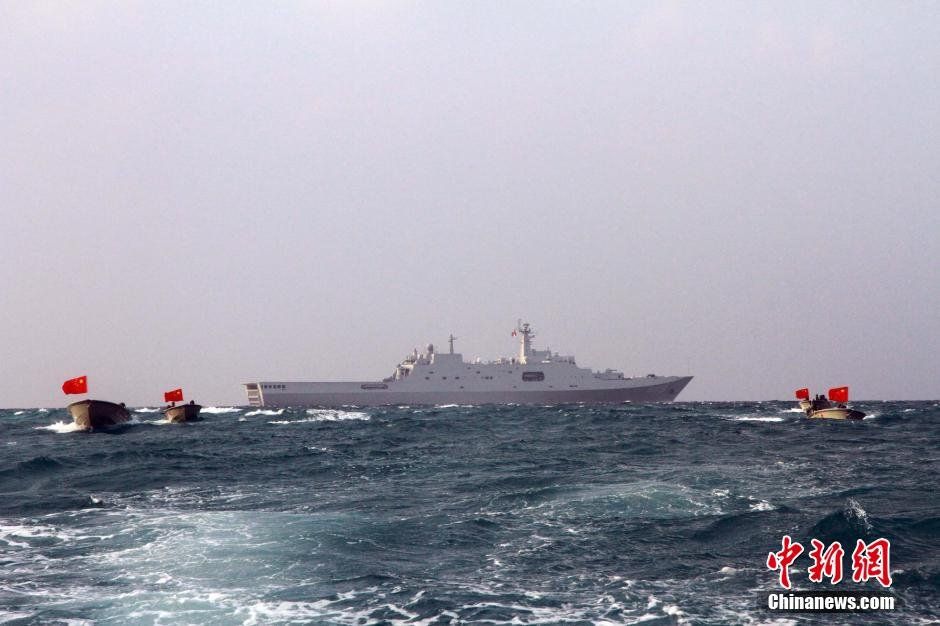
Mixed Messaging Surrounds Latest South China Sea Moves
Publication: China Brief Volume: 14 Issue: 2
By:

On January 1, new fishing regulations for the South China Sea, issued by the province of Hainan, went into effect, prompting objections from China’s territorial rivals in Southeast Asia, as well as the United States and Japan (Xinhua, January 10). Chinese spokespeople have sought to defuse this criticism by depicting the new rules as consistent with the status quo, and by insisting that they do not presage greater enforcement or efforts to expand effective control of disputed territory. Taken together with November’s announcement of an Air Defense Identification Zone (ADIZ) over the East China Sea (see China Brief, November 27, 2013), China appears to be following a peculiar strategy: issuing rules about disputed territory that raise fears of aggression among its neighbors, not visibly enforcing them, and, at the same time, strenuously denying that it is making progress toward realizing its territorial claims.
The foreign ministries of the Philippines and Vietnam vowed to ignore what both described as an “illegal” move, with the Philippine Foreign Affairs Minister Alberto del Rosario further promising to raise the issue at the January 15–18 meeting of ASEAN foreign ministers (South China Morning Post, January 11, Philippine Star, January 17). Meanwhile, U.S. State Department spokesperson Jen Psaki called the move “a provocative and potentially dangerous act,” and Japanese Defense Minister Itsunori Onodera said that “not only Japan but the international society as a whole has a concern that China is unilaterally threatening the existing international order” (U.S. State Department daily press briefing, January 9; Japan Update, January 15).
As Isaac Kardon writes in this issue of China Brief, the new regulations appear to contain only minor revisions to language that has been on the books for years, and neither extend nor clarify China’s territorial claims. Emphasizing this interpretation, China’s communications strategy has stressed that the new regulations do nothing to change the status quo. Foreign Ministry spokesperson Hua Chunying described the regulations as “technical amendment to a local fishery regulation that has been implemented for years,” and said that “that there is no difference between the measures and the Fisheries Law enacted in 1986 in terms of provisions on the entry of foreign fishing boats in the waters under China’s jurisdiction” (Chinese Ministry of Foreign Affairs press conference, January 10). Hua did also suggest that China’s critics “either lack common sense or [have] ulterior motives.”
The tone of these remarks echo the efforts of Chinese spokespeople to defuse international criticism following the late November announcement of the new ADIZ over the East China Sea. It is most likely that the ADIZ and the new fishing regulations were conceived or at least approved as a package—although they did not attract international attention until going into force this year, they were passed by Hainan’s legislature on November 29, the day after the ADIZ was announced, and reported immediately in the Chinese press (Xinhua, December 1, 2013).
Predictably, commentary in the Chinese press was somewhat more pointed. While official statements did not take note of the Philippine and Vietnamese response, a widely reprinted Global Times article complains that the Philippines “ignores Chinese law” (Global Times, January 13). The most widely distributed commentary appears to be an op-ed picked up by Xinhua from the Guangzhou Daily, titled “America Should Not Always Stir up Trouble in the South China Sea,” blaming the row on meddling by the United States (Xinhua, January 11). Meanwhile, China is commemorating the 40th anniversary of the Battle of the Paracels, in which China took full control of the islands from Vietnam (Xinhua, January 20). China’s navy began a naval drill, including amphibious landing exercises, on the anniversary of the battle.
Taken together, the two incidents raise a pair of interlocking conundrums: First, if the new regulations do not strengthen China’s claims to disputed territory, what about them makes them worth weathering international criticism? Second, if China does genuinely fear the emergence of a U.S.-organized balancing coalition, why does it regularly “play into the hands” of such a coalition by taking actions that raise fears among its neighbors and thus appear to undermine the strategy of “consolidating friendly relations” laid out by Chinese President Xi Jinping last October (see China Brief, November 7, 2013)?
Although such subtleties may be lost on China’s neighbors, China does appear to be attempting to draw a distinction between states with which it hopes to work past disagreements, such as Vietnam, and countries it has written off as rivals, such as Japan and, to a lesser extent, the Philippines. Wu Shicun, the President of the MOFA-affiliated National Institute for South China Sea Studies, has appeared several times in Chinese media to reassure Southeast Asian countries that China does not plan to establish an ADIZ in the South China Sea, nor to introduce other elements of its relatively aggressive policy toward Japan. Writing in the Global Times, he frankly described the establishment of the ADIZ as “answering blows with blows,” but argued that China’s claims in the south are still too ill-defined to be defended in the same manner, noting that China has not established a territorial sea baseline for its claim to the Spratley (Nansha) Islands or defined the legal status of the nine-dashed line (Global Times, January 14). Furthermore, he wrote that trade, and the establishment of a “maritime silk road,” take precedence over territorial disputes, and might preclude one. In an interview on January 19, he also claimed that, owing to “current law-enforcement capacity and technical limitations” the new regulations will be enforced only in the Paracel (Xisha) Islands and the area surrounding the Scarborough Shoal (Zhongsha), over which China already has effective control, and not the divided Spratleys (Nansha) (Global Times, January 19).
It is unlikely that such moves are aimed at placating a constituency of hard-line nationalists—on the contrary, by insisting that China is not strengthening its control of disputed territory and tolerating its neighbors’ ignoring its rules, the government is surely providing fodder for nationalist criticism.
More likely, it seems that China is trying to establish legal frameworks to be called upon later, either in justifying novel actions and practices, to defend the legitimacy of its actions in an unplanned incident, and to consolidate the changes in the status quo that have taken place over the past few years. This may already be happening with the ADIZ: On January 23, Air Force spokesperson Shen Jinke announced that Chinese aircraft have been regularly patrolling the zone, and have “beefed up China’s effective control over the ADIZ,” according to a Xinhua report (Xinhua, January 23).





